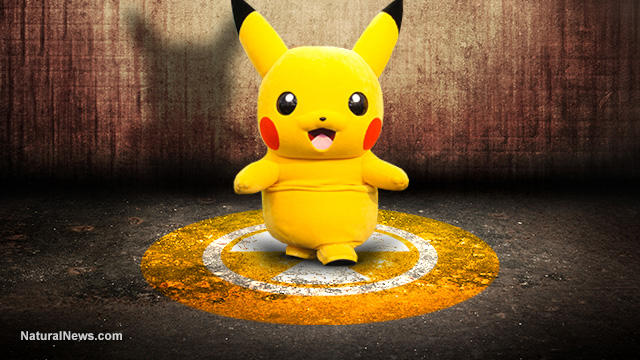Rare Pokemon planted in Fukushima to lure tourists back; catch a Pokemon in the game, get radiation poisoning in real life
Wednesday, September 07, 2016 by: David Gutierrez, staff writer
Tags: Pokemon Go, Fukushima, tourists

(NaturalNews) Japanese government officials have partnered with Niantic, the maker of the blockbuster smartphone game Pokemon Go, in an effort to try and draw tourists back into regions affected by the 2011 Fukushima nuclear meltdowns.
Niantic has agreed to highly appealing Pokemon Go attractions in the Iwate, Miyagi and Fukushima prefectures, which were all affected by the 2011 earthquake and tsunami. It has also agreed to do the same in Kumamoto prefecture, in the country's south, which suffered from several large earthquakes in April.
Fukushima Daiichi Nuclear Power Plant operator, Tokyo Electric Power, continues to suffer setbacks in its ongoing efforts to clean up the nuclear disaster. A much-vaunted "ice wall," designed to keep radioactive groundwater from flowing out of the plant, is supposedly 99 percent complete, yet water flow has barely slowed. And scientists admit that the melted-down reactor cores remain inaccessible, and cleanup of the plant itself may be decades away.
TEPCO objects to Pokemons being placed in radiation zones
Pokemon Go is played by "catching" virtual Pokemons at real-world locations; a player's phone vibrates when a Pokemon is nearby. A player can throw a "PokeBall" to attempt to capture a Pokemon. Pokemons can then be trained and fight against other players' Pokemons at special locations called "PokeGyms."Under Niantic's partnership with the four prefectures, game designers will add extra PokeGyms to the areas, as well as PokeStops where players can find valuable game items. Niantic has also agreed to place a higher than usual frequency of rare Pokemons in the four prefectures.
Fukushima tourism promotion officials say that 90 percent of the prefecture lies outside of the radiation exclusion zone, and that visiting these areas is completely safe. But TEPCO recently had to reprimand Niantic for placing Pokemons at the actual site of the Fukushima Daiichi plant. The power company has asked Niantic to refrain from placing any Pokemons within the radiation-affected areas of Fukushima.
Play with caution
Radiation poisoning isn't the only risk unwary players run when playing the global hit game. Unsuspecting users have been known to place themselves in physical danger, in at least one case literally walking off a cliff while searching for Pokemon.In July, security bloggers warned that the game's Terms of Service allowed Niantic to access users' entire Google accounts, including email, calendars, photos and documents. The company claimed that the agreement was unnecessarily broad and would be modified, because the game only needed access to player's Google profiles, not their entire accounts.
But privacy advocates warned that the case illustrated how users of online software may be signing away more than they know when they click "accept" on this and other apps.
"A number of these games are not only making money on the front end by selling you the game or things within the game, they're also collecting data about your habits and what you're doing on your phone, and selling that to third-party marketers," said Andrew Storms, vice president of security services at security company New Context. "You're pretty much giving the rights to all your information to this company."
Security experts have also warned that Niantic reserves the right to store and use information on your location – which it tracks whenever you are playing the game (and possibly at other times, as well). Its privacy policy makes it clear that it is free to hand this information over to law enforcement or even private parties at its own discretion, if it decides you might be engaged in unethical activities.
Niantic is also permitted to share players' non-identifying information – including movement patterns – with other companies for "research and analysis, demographic profiling, and other similar purposes."
Sources for this article include:
SBS.com.au
DailyMail.co.uk
NYTimes.com
CNN.com
NYTimes.com
PowerMag.com
TheGuardian.com
Science.NaturalNews.com
Pokemon Go at FETCH.news
Get independent news alerts on natural cures, food lab tests, cannabis medicine, science, robotics, drones, privacy and more.
Take Action: Support Natural News by linking to this article from your website
Permalink to this article:
Embed article link: (copy HTML code below):
Reprinting this article:
Non-commercial use OK, cite NaturalNews.com with clickable link.
Follow Natural News on Facebook, Twitter, Google Plus, and Pinterest
- Newly released JFK files reveal Pentagon's role in creating Lyme disease and covid in the same lab
- Woman contracts WORLD'S DEADLIEST VIRUS after unknowingly being given the WRONG VACCINE
- Kiss Your Genetic Privacy Good-Bye! 23andMe Gets Green Light to Sell Your Intimate Genetic Details to Anyone They Want
- AI weather model outperforms traditional forecasts, boosts accuracy by 20%
- Revolutionize your diet with pomegranate: The miracle juice for gut health and metabolism
- Advisory: Ex-FBI agent exposes likely ATF honeypot operation selling illegal Glock switches
- The case for locking up the Deep State's biggest hatchet man...
- Analysis: The coming economic collapse, a mass uprising and Trump's three secret weapons to halt the growing revolt
- At least 75 percent of Americans are unknowingly MEDICATED FOR STUPIDITY by fluoridated water – Utah now banning it
- Sweden's migrant crisis deepens as failed green energy venture leaves thousands jobless, exposes systemic collapse
- U.K. unveils controversial pandemic preparedness tool: A double-edged sword?
- Trump administration CUTS FUNDING to Gavi, the Vaccine Alliance - a major blow to the Bill Gates-backed entity
- DHS Secretary Kristi Noem plans to dismantle FEMA
- Health Ranger Report: Ashton Forbes discusses TELEPORTATION ORBS and their role in MH370 disappearance
- Pediatric dentist exposes fluoride dangers as more states ban toxic water additive
- We are closer to all-out war in Europe, in Asia, and in the Middle East than most people realize
- Can special diets and supplements help kids with autism? A new research offers hope and hints at what works
- Gold reaches all-time high amid escalating trade tensions
- Newly released JFK files reveal Pentagon's role in creating Lyme disease and covid in the same lab
- Analysis: The coming economic collapse, a mass uprising and Trump's three secret weapons to halt the growing revolt
- Trump nominates VACCINE ZEALOT Susan Monarez to lead the CDC, sidelining RFK Jr.'s reform efforts
- Trump's greatest betrayal so far: Accelerating Middle East wars, silencing dissent, and serving Zionist masters
- CDC finally halts $11 billion COVID funding scam as health officials admit the ‘pandemic’ was a fraud
- The hidden dangers in your kitchen: How cooking methods impact diabetes, cancer and aging
- BEWARE: USDA allows genetically engineered vaccines to infiltrate organic food production
- Obama accused of laundering USAID funds to fuel global protest movements, regime change operations
- DEADLY DECEPTION: How COVID vaccines increased mortality rates and why authorities hid the truth
- Here are TEN all-natural ways to protect your garden without using harmful chemicals
- Dr. Mike Yeadon releases 15-minute testimony - WATCH - about genocidal intent of COVID “vaccines”
- Festive flavors: The sweet history, nutritional profile and health benefits of pecan pie
- Big Pharma's media takeover: How drug companies bought the news - and your health
- Dr. Suzanne Humphries makes bombshell appearance on Joe Rogan podcast, exposing vaccine industry deception back to POLIOMYELITIS
- Elon Musk: Aliens could be here on Earth RIGHT NOW
- 5 Simple steps to boost your brainpower: How to strengthen executive function in a distracted world
- Trump reverses course on Gaza plan, says “nobody is expelling Palestinians”
- California's social media censorship law struck down: A victory for free speech or a threat to online safety?
- Newly released JFK files reveal Pentagon's role in creating Lyme disease and covid in the same lab
- EPA advisor admits the agency is funneling billions to climate groups ahead of Trump’s return to White House
- California's social media censorship law struck down: A victory for free speech or a threat to online safety?
- Dr. Mike Yeadon releases 15-minute testimony - WATCH - about genocidal intent of COVID “vaccines”
- The Health Ranger releases “Vaccine Zombie” song and music video, using AI-animated zombies for the music video
- Florida takes a stand: DeSantis proposes permanent ban on mRNA vaccine mandates
- The pandemic as a tool for INDOCTRINATION: Understanding “The Indoctrinated Brain” by Dr. Michael Nehls
- “Why we influenced the 2020 elections”: Facebook files reveal the coordinated effort to bury the Hunter Biden laptop story
- Mike Adams releases country western hit single: Goin’ Back in Time is Comin’ Home
- Mike Adams releases music poetry sensation: A Child of God
- Unpacking the Lies That We’ve Been Fed – new song and music video released by Mike Adams, the Health Ranger
- Michigan sheriff announces criminal investigation into 2020 election crimes, Dominion Voting Systems
- Migrants are taking advantage of recent hurricanes to scam residents and loot their homes
- House Intelligence Committee calls for the ARREST and PROSECUTION of Dr. Anthony Fauci
- Rep. Nancy Mace introduces bill to ban biological males from female facilities on federal property
- Peter Rost exposes Big Pharma corruption in his book “The Whistleblower: Confessions of a Healthcare Hitman”
- Former horse rancher and 6,000 other plaintiffs are suing Syngenta after paraquat exposure led to Parkinson's Disease
- Mike Adams releases new song and music video: Nothing More Disgusting Than a Globalist
- Red Cross issues warning to stop blood plasma donations from vaccinated people
- Scientists confirm: GENIUS brain function can be spontaneously unleashed in humans without any apparent cause
- EPA advisor admits the agency is funneling billions to climate groups ahead of Trump’s return to White House
- HYSSOP: What research reveals about the health benefits of this ancient holy herb
- Two containers with completed ballots fall out of truck in Florida
- Fully vaccinated about to see “tsunami” of illness and death, warns virologist
- Global leaders unite to clamp down on “misinformation” with UN-backed Cascais Declaration
- BREAKING: 2025 NDAA authorizes mandatory military draft of WOMEN across America… as Pentagon pursues global NUCLEAR war with both Russia and China at the same time
- Michael Yon warns of a ZIONIST TAKEOVER in Trump’s second administration
- BOMBSHELL: DNA testing kits are a SCAM to develop ethnic-specific bioweapons
- Ozempic and Wegovy weight loss drugs are injectable LIZARD VENOM PEPTIDES that may unleash a devastating wave of organ failure… side effects align with symptoms of SNAKE BITES
- Israeli soldiers accused of even more torture and abuse in the West Bank
- These 13 countries just signed an agreement to engineer a global FAMINE by destroying food supply
- NASA admits that climate change occurs because of changes in Earth’s solar orbit, and NOT because of SUVs and fossil fuels
- RFK Jr. clears key hurdle: Sen. Susan Collins backs controversial HHS nominee, signaling a new era for health policy
- Sermon 30: How Jesus reveals Caesar’s FAKE CURRENCY and FALSE AUTHORITY
- Coriander seeds: Ancient medicine backed by modern science
- Arizona officials claim Maricopa County needs 10-13 days to tabulate results of the election
Science News & Studies
Medicine News and Information
Food News & Studies
Health News & Studies
Herbs News & Information
Pollution News & Studies
Cancer News & Studies
Climate News & Studies
Survival News & Information
Gear News & Information
News covering technology, stocks, hackers, and more



"Big Tech and mainstream media are constantly trying to silence the independent voices that dare to bring you the truth about toxic food ingredients, dangerous medications and the failed, fraudulent science of the profit-driven medical establishment.
Email is one of the best ways to make sure you stay informed, without the censorship of the tech giants (Google, Apple, Facebook, Twitter, YouTube, etc.). Stay informed and you'll even likely learn information that may help save your own life."
–The Health Ranger, Mike Adams












































